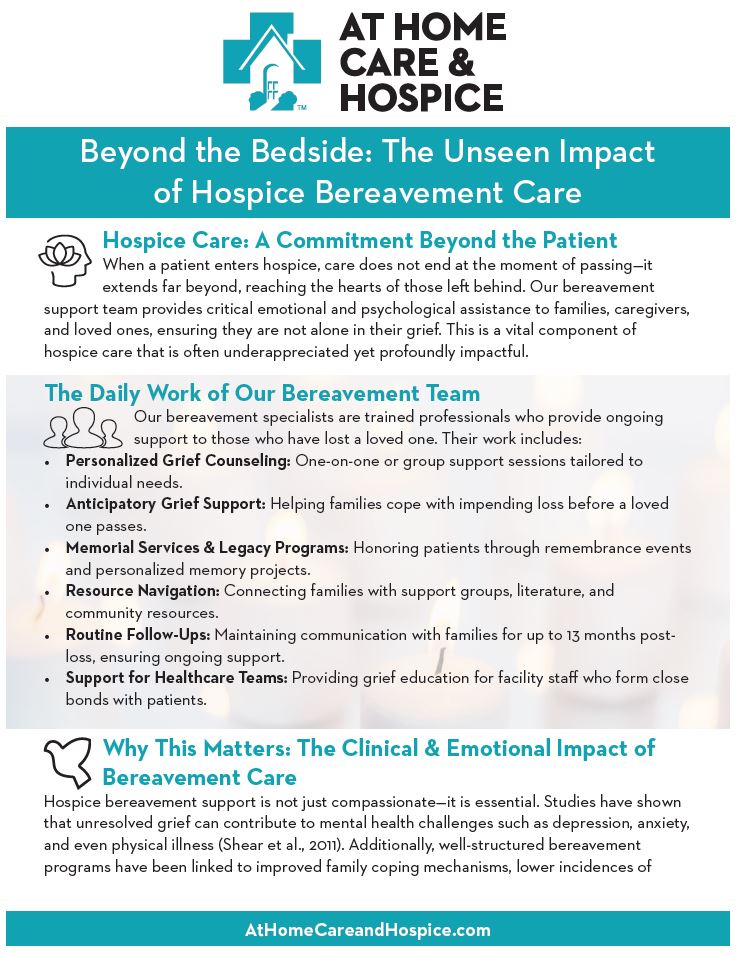Hospice Care: A Commitment Beyond the Patient
When a patient enters hospice, care does not end at the moment of passing – it extends far beyond, reaching the hearts of those left behind. Our bereavement support team provides critical emotional and psychological assistance to families, caregivers, and loved ones, ensuring they are not alone in their grief. This is a vital component of hospice care that is often underappreciated yet profoundly impactful.
The Daily Work of Our Bereavement Team
Our bereavement specialists are trained professionals who provide ongoing support to those who have lost a loved one. Their work includes:
- Personalized Grief Counseling: One-on-one or group sessions tailored to individual needs.
- Anticipatory Grief Support: Helping families cope with impending loss before a loved one passes.
- Memorial Services & Legacy Programs: Honoring patients through remembrance events and personalized memory projects.
- Resource Navigation: Connecting families with support groups, literature, and community resources.
- Routine Follow-Ups: Maintaining communication with families for up to 13 months post-loss, ensuring ongoing support.
- Support for Healthcare Teams: Providing grief education for facility staff who forms close bonds with patients.
Why This Matters: The Clinical & Emotional Impact of Bereavement Care

Hospice bereavement support is not just compassionate – it is essential. Studies have shown that unresolved grief can contribute to mental health challenges such as depression, anxiety, and even physical illness (Shear et al., 2011). Additionally, well-structured bereavement programs have been linked to improved family coping mechanisms, lower incidences of prolonged grief disorder, and reduced hospitalizations for bereaved individuals due to stress-related conditions (Guldin et al., 2012).
Key Statistics: The Power of Bereavement Support
- 85& of families who received hospice bereavement services report feelin better equipped to handle their grief (National Hospice and Palliative Care Organization [NHPCO], 2021).
- 70% of caregivers experience anticipatory grief, and support can significantly ease the transition (Christakis & Iwashyna, 2003).
- Bereaved spouses receiving hospice-based grief support have a 25% lower risk of depression compared to those without support (Wright et al., 2008).
Setting Your Patients & Families Up for Holistic Care
Referring a patient to hospice means providing comprehensive support that extends beyond physical care – it ensures that their loved ones are supported long after they are gone. Our bereavement services are a cornerstone of this commitment, giving families the guidance and tools to process their grief in a healthy, supported manner.
Let’s Work Together
We invite you to partner with us to ensure your patients and their loved ones receive the full spectrum of care they deserve. Contact us today to learn more about how our hospice team can provide unparalleled bereavement support, making a lasting difference for families in need.
References
Christakis, N. A., & Iwashyna, T. J. (2003). The health impact of health care on families: A matched cohort study of hospice use by decedents and mortality outcomes in surviving, widowed spouses. Social Science & Medicine, 57(3), 465-475.
Guldin, M. B., Vedsted, P., Zachariae, R., Olesen, F., & Jensen, A. B. (2012). Complicated grief and need for professional support in family caregivers of cancer patients in palliative care: A longitudinal cohort study. Supportive Care in Cancer, 20(8), 1679-1685.
NHPCO. (2021). Facts and figures: Hospice care in America. National Hospice and Palliative Care Organization. Retrieved from https://www.nhpco.org
Shear, M. K., Frank, E., Houck, P. R., & Reynolds, C. F. (2011). Treatment of complicated grief: A randomized controlled trial. JAMA, 293(21), 2601-2608.
Wright, A. A., Zhang, B., Ray, A., Mack, J. W., Trice, E., Balboni, T., & Prigerson, H. G. (2008). Associations between end-of-life discussions, patient mental health, medical care near death, and caregiver bereavement adjustment. JAMA, 300(14), 1665-1673.

Download a copy of this article here.

